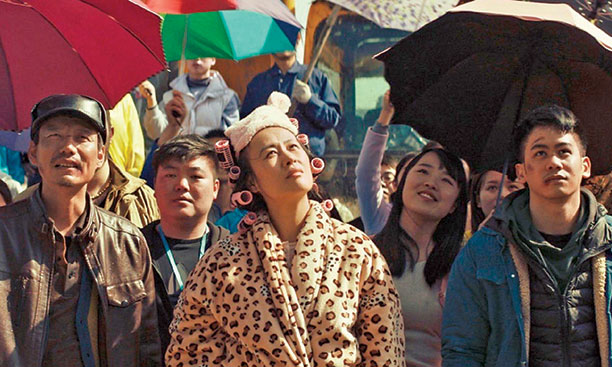
As a kid growing up on two continents, Cathy Yan ’08 would run around with a video camera and chronicle life as she saw it. Her peripatetic childhood, Yan says, made her a natural observer; making movies became a way to understand the changing world around her.
It’s the kind of story you hear often in profiles of rising filmmakers. These anecdotes of precocious enthusiasm — of budding auteurs and their homemade epics — later pay off in a cascade of industry success: in blazing runs through film school; in scrappy, acclaimed first features; and then, finally, in the big break, when a studio hands over the keys to a summer blockbuster. In many ways, Cathy Yan’s career fits this arc to a T. In January, her first film out of New York University’s film program, Dead Pigs, won a jury award at Sundance. By April, Warner Brothers had announced Yan as its choice to direct the next film in the Batman cinematic universe.
In other ways, however, Yan’s narrative differs considerably from the norm. For one thing, Yan is Chinese and a woman at a time when film directing continues to be dominated by white men. (Yan is the first Asian woman to direct a Hollywood superhero movie.) According to a UCLA study released earlier this year, people of color directed just 12.6 percent of Hollywood films in 2016; women, meanwhile, made up fewer than 7 percent of film directors that year.
Nor was Yan’s career trajectory a simple A-to-B progression. It took her to Princeton, for starters — which is why you’re reading about her here — then to a career in daily journalism, and then through a series of baby steps, calculated risks, test runs, and part-time jobs, before she finally took the big leap to Dead Pigs, a black comedy about modernization in China.
It’s a trajectory, Yan says, that probably turned out to be more circuitous because she is a Chinese woman. Less because of any overt discrimination, she says, and more because of how she grew up thinking about herself, and success, and what kind of people get to make movies. “Frankly, I didn’t see anyone who looked like me doing what I wanted to do. There were no real role models,” she says. “Almost every director was male, and if they were a woman, they were a white woman. That made it difficult, too, because I do think it’s important to have role models in order to understand that you can do what they do. That took a while.”
Yan spent the majority of her childhood moving between Hong Kong and the East Coast of the United States, including an early detour to Princeton, where her father, Andrew Yan *90, studied for a master’s degree in sociology. (He is now managing director at a private-equity firm.) By the time Yan returned to Old Nassau in 2004, she was still passionate about art and cinema, but was also interested in politics, photography, economics, dance, clothing, journalism, hip-hop, and technology. And she was driven to demonstrate her abilities in an academic setting.
Looking back, Yan says, in some ways going to Princeton made it “that much harder to go into a field like film.” She explains: “If you go into a school like Princeton that’s focused on academics, there’s a very binary way of judging how intelligent someone is, so I think that made it a little more difficult to take the risk” of pursuing creative work. (In 2006, the University made it easier, launching a major initiative to promote arts education that culminated last year in the opening of a new arts neighborhood.)
At Princeton, Yan majored in public policy and wrote a 133-page thesis on “Internet-mediated Social Movements and Political Change in China.” During summers, she interned at a fashion magazine and at the Los Angeles Times’ Beijing office. Her main artistic outlet was the hip-hop dance crew diSiac, where she quickly became creative director. She still draws on what she learned putting together the group’s shows: “It had a huge impact. There’s not that much of a difference between choreographing — which is visualizing something in your head and then working with other people in blocking that vision in actual space, and adding lights and costumes and music in order to tell a story or convey emotion — and directing.”
Yan’s friend Michael Wood ’08, who danced in diSiac with her and now works as a nonfiction filmmaker, said Yan was “infamous within the company for really getting people to take action. Cathy is not afraid to call people out. Cathy is not afraid, period.” People respected Yan because she held herself to the same high standards, Wood says: “Cathy was pretty famous for being someone who could do it all. We’d be like, how does she sleep? She’d be up until midnight running a rehearsal and then cram for a final, go in there, [and] ace the test … .”
After college, Yan took a job as a reporter for The Wall Street Journal. As a junior staffer, she was “often pulled in to write the blog posts and maintain a vicious 24-hour news cycle,” which didn’t interest her. One upside was that she was also tapped to do video journalism, which was then in its early days and seen as a sideshow by more senior writers. “It was like, here’s a camera; go out and shoot something while you’re writing the story,” she recalls. Along the way, Yan began pitching more articles about film and met several first-time filmmakers. “I was speaking to these people who weren’t that much farther along than me — it wasn’t like speaking to Martin Scorsese. When you start tracking these people, it feels a little more accessible.”
Yan started to wonder: Why couldn’t she do what these directors were doing? Were they really so different? To find out, she volunteered to help produce a student film directed by her college friend Wood, who was then at NYU film school. And by 2013, she had decided to apply to film school herself. Even then, though, she hedged her bets, applying to a dual-degree program at NYU that would lead to master’s degrees in film and business. The program “allowed me to take that step into film school without feeling like I was going to film school, you know?” she says. “It felt more doable, because I was still getting an MBA. Even when I entered, I didn’t realize I wanted to be a filmmaker, like a writer/director, until my second year. ... I thought I wanted to be a producer, development exec, or creative exec.”
Deep down, it’s not that she didn’t want to pursue her creative side, Yan says. Rather, “there was this torment inside and this fear” that she couldn’t do it, and that trying to become a director would mean gambling with her career. “All my other friends were, like, making lots of money and being successful,” she says. Film school itself wasn’t too great a divergence from the traditional path of success: “At the end of the day, I could tell people that I was working toward two degrees from NYU. And we all love getting more degrees!” The real leap came after graduation, when she decided to put all her energy into writing and directing Dead Pigs.
Her film, mostly shot in Mandarin with English subtitles, is an interlocking epic that follows the struggles of five Shanghai residents amid a mass pig die-off that clogs the city’s waterways. That pork apocalypse was an event that really happened in 2013; Yan’s film is stuffed with stranger-than-fiction details of life in modern China: There’s a tense dramatization of the “shadow-banking system” that threatened to crash China’s economy in the early 2010s; a deadpan satire of the “copycat architecture” in which reproductions of European landmarks crop up in Chinese housing developments; a pitch-perfect re-creation of the company cheer routines some Chinese stores use to motivate employees; and a darkly comic chronicle of one homeowner’s battle against the forces of urban redevelopment. Oh, and a full-blown Chinese karaoke number, complete with scrolling lyrics at the bottom of the frame.
In the hands of an outsider, this might come off as sensationalistic and exoticizing — or at the very least, a tonal mishmash. But Yan draws on her Chinese heritage and journalist’s eye to balance out the satirical flourishes. It’s a complex undertaking for a first feature, but Yan says she just “put one foot in front of the other” and stuck to her vision. Larger industry trends helped the process along: In the rising Chinese film market, Yan says, “we were able to make a bigger film at a lower cost” — about $2 million, which while miniscule by Hollywood standards is a sizable budget for an untested writer-director fresh out of film school.
Yan explains why she made the movie she did: “If I had made a two-person rom-com set in Brooklyn — that’s not something I have a special, unique perspective on, and because there are so many of them, you have to make your movie so much better [than the rest]. Not that my movie isn’t good! But if you do the same thing everyone else is doing, how do you stand out? You have to do what you’re passionate about, what’s unique to your perspective and your fire.”
Yan’s bold strokes paid off when she landed what was then called “Untitled Girl Gang Film” — a film that is now known to follow a group of female heroes and villains (the “Birds of Prey”) from the DC Comics canon. The film’s marquee star is the Oscar-nominated actress Margot Robbie, who will be reprising her role as Batman’s nemesis Harley Quinn, a prison psychologist who becomes a pastel-hued maniac after falling in love with The Joker.
According to industry news sites, Yan beat out several high-profile male directors for the job on the strength of her pitch to Robbie and a group of studio executives. “Half the pitch was seeing [Dead Pigs],” Robbie told IndieWire in May. “You could just see that [Yan was] someone who’s a very capable filmmaker. It doesn’t scare me to see her do a film on a much larger scale because she clearly has the instincts and the organizational skills, and she can delegate. You can’t pull off a film in China for as little money as she had, and make it look so incredible, and still care about the characters more than anything, right? I mean, she just — in my mind — nailed it.”
In winning the job, Yan joins a heterogeneous new class of superhero-movie directors that includes Black Panther’s Ryan Coogler, Aquaman’s James Wan, Wonder Woman’s Patty Jenkins, and Ava DuVernay, who is developing a movie featuring DC Comics’ New Gods. DuVernay, who had a long career as a film publicist before making the leap to direction, has become a leading voice for inclusion in Hollywood and was one of the first to congratulate Yan after Warner Brothers hired her. The goal for film studios, DuVernay says, should not be to pay lip service to “diversity.” Instead, she says, workplaces should create genuine environments of “inclusion” and “belonging”: As a popular saying puts it, if diversity means getting invited to the party, inclusion means being asked to dance.
Superhero movies have never been more in need of fresh eyes. For all of their cultural dominance, it’s a genre on the brink of a financial reckoning: The recent underperformance of movies like Warner Brothers’ Justice League (where the presence of Batman, Superman, and Wonder Woman combined couldn’t lure mass audiences) has demonstrated that popular characters are not always enough to guarantee success.
Instead, it’s been comic movies with strong directorial visions — remember Black Panther’s Afro-futurist fantasia — that have scored best lately among critics and audiences. To that end, Yan says, she plans to infuse her film with the same kind of dark but daffy comic tone that made Dead Pigs a success. One of her biggest challenges will be to ace the comic-book genre’s many combat scenes, and to study up, she’s been returning to many of her favorite movies from her ’90s childhood, “that era of just a good old action movie that was less about blowing up the universe and more about classic action.” At Princeton, Yan says, she would have been more likely to speak about influences by citing the early cinema of Chinese auteur Zhang Yimou — but in truth, her taste has always been equal parts arthouse and multiplex, and she’s been watching classics like Speed and Con Air to prepare for her big assignment.
While she can’t divulge the “Birds of Prey” plot, she says the project, for all its big-budget trappings, feels like a natural extension of the themes she explored in Dead Pigs. “You can never remake your first film,” she says. But many of the “beats and storylines” of the Harley Quinn film speak to her in a personal way, she says — and “if you feel like the voice is right, and you feel like it fits your sensibility, that’s huge.”
For Yan, it’s been a winding path to Gotham City — but it’s a destination, she says, that ultimately feels good: “Sometimes you just have to give more credit to what you instinctually wanted to do when you were a kid, if that makes sense.”
David Walter ’11 is a freelance journalist in New York.








No responses yet